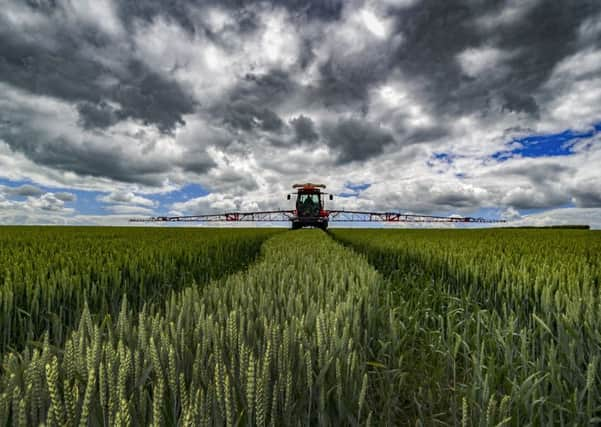Costly weedkiller ban could put struggling farms out of business


Any European Union ban on herbicides containing glyphosate - such as Roundup - could cost British farmers almost £1bn in lost outputs, reduce tax revenues generated by the food and farming industry by £193m - an amount equivalent to the annual salaries of more than 7,000 nurses, see wheat production drop 20 per cent and raise food prices, according to a new analysis.
Stokesley-based arable farmer Mr Bainbridge agreed with the findings and urged the European Commission, which is currently reviewing the chemical ingredient, to heed ‘good science’ after the European Chemicals Agency recently ruled that the scientific evidence “did not meet the criteria to classify glyphosate as a carcinogen, as a mutagen or as toxic for reproduction”.
Advertisement
Hide AdAdvertisement
Hide AdMr Bainbridge, a county chairman for the National Farmers’ Union, said: “It would be like taking one of my main tractors away from me and saying you can’t use it, and my costs would double and my yields halve.”
Reports suggest the European Commission will propose a reauthorisation of its use for another 10 years, with a decision to follow next month, but environmental campaigners remain vociferous in expressing concerns and the possibility remains of a glyphosate ban across member states.
Mr Bainbridge said: “It’s extremely frustrating. People don’t know what damage they are doing by spreading messages that aren’t science-based - it could put farmers out of business.”
Researchers at Oxford Economics, The Andersons Centre and the Crop Protection Association, who measured the potential economic impact of any ban, said the “overwhelming majority” of scientific evidence proved glyphosate was safe.
Advertisement
Hide AdAdvertisement
Hide AdIan Mulheirn, director of consulting at Oxford Economics, added: “Our report’s findings are very clear, a glyphosate ban will negatively impact UK GDP and agriculture, at a time of real uncertainty for British farmers.
“If glyphosate was not approved for use in the UK but remained available in the rest of the world, this would place domestic production at a considerable disadvantage. An EU-wide ban could even push up food prices for consumers.”
Sarah Mukherjee, chief executive of the Crop Protection Association, claimed that the debate around glyphosate is “more about politics than science”, saying: “Glyphosate is and always has been safe, with over 40 years of robust scientific evidence showing no risk to safety.”
She said the government should champion a science-led approach to decision-making and vote to renew glyphosate’s licence, warning: “Failure to do so risks damaging the economy, the environment and the agricultural sector.”
FARMERS SEEK POLITICAL BACKING
Advertisement
Hide AdAdvertisement
Hide AdIn an open letter sent to new Environment Secretary Michael Gove on Monday, the president of the National Farmers’ Union, Meurig Raymond, wrote that he “very much” hoped Mr Gove would support the reauthorisation of glyphosate.
And earlier this year, at an event in Leyburn in March, Farming Minister George Eustice - who now works alongside Mr Gove at the Department for the Environment, Food and Rural Affairs (Defra) - suggested the government would not bow to political pressure when ruling on the use of glyphosate as a weed killer when the UK sets its own rules following its exit from the European Union.
Farmers took the opportunity to raise fears about the government’s attitude to the use of glyphosate on crops, but Mr Eustice told them: “I get tens of thousands of emails on this but we follow the evidence, we follow the science and the science says it is safe.”